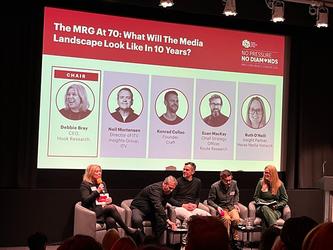AI could help marketers’ use of insight, says Dentsu UK media CEO

Speaking at the Media Research Group conference in London on Wednesday, Bullis said that despite a “huge amount of fear, confusion and a skills gap in the UK”, AI was “making significant inroads into measurement and insights”.
Bullis said she was optimistic about AI’s role in the industry going forwards: “AI is here to stay, and I think it is here to help us.
“I want an industry that does better marketing, and I believe marketing analytics, measurement and insights are the path to do that. AI will help us do that more accurately, more frequently, in more places, faster and make it more accessible to more of our stakeholders.
“It is creating huge disruption, so the question for me is how do we, as professionals, thrive in this brave new world. I think that comes down to attitude.”
Bullis told the conference that there had been many changes in recent years in marketing and connected industries, noting that “digital and data transformations in business are constant programmes now – they are never done, never finished and they will constantly keep driving complexity”.
This was creating a lot of “noise”, she added, on the best ways forward for marketing. “We can’t move for opinions, tools, courses, terror and fear around AI. There is much wailing and gnashing of teeth around cookies – are they gone, oh they’re back, now they’re just slipping away.
“Then you have the rapid rise of the marketing ‘thinkfluencer’ – I both love and hate LinkedIn for this. There are constantly people telling me what good advertising, good measurement and good tech looks like.”
For audience measurement, Bullis said media fragmentation means more media consumption happens with some digital data signal and “less media is happening in perfect unknown isolation, such as linear TV through an aerial”.
Bullis said she thought that “in the UK, we may be accused of being slightly overly proud of the legacy of our audience panels”, describing the panels as good if they are useful but “at worst, we become fixed to those panels and unchanging”.
“Why use a panel when your own data is more granular, more accurate, it’s in greater volume and it’s faster,” she added.
“Single source panels were the gold standard, but compute power, data access and modes of consumption challenged this, as we should too.”
Bullis also voiced doubts over attempts to measure consumers’ attention to advertising, explaining: “I am on the fence, despite some of the evidence I have seen, even in my own company; I have not seen enough independent, rigorous research.”
Bullis said that there were a few lessons to take from the current media landscape, including that media mix modelling was the best technique to understand marketing effectiveness, but shouldn’t be used as a silver bullet for every problem.
She also argued for experiments as the “most important starting point for effectiveness” to ensure advertising works.
Bullis said: “Is it any wonder that the hyper-growth, hyper-successful businesses like Meta, Google, Amazon, Booking.com, Next and the gaming industry institutionally adopt experimentation into their own marketing, whereas it is only 6.7% of CPG and 4% of automotive? Whose businesses are more successful and growing faster? If marketers do nothing else, do experiments.”
Attribution (the measure that estimates how marketing impacts customer interactions) should no longer be used, Bullis added, saying that “the lack of visibility fundamentally impacts accuracy, and the issue with attribution is there is no way to know how inaccurate it is – that makes me very uncomfortable”.

We hope you enjoyed this article.
Research Live is published by MRS.
The Market Research Society (MRS) exists to promote and protect the research sector, showcasing how research delivers impact for businesses and government.
Members of MRS enjoy many benefits including tailoured policy guidance, discounts on training and conferences, and access to member-only content.
For example, there's an archive of winning case studies from over a decade of MRS Awards.
Find out more about the benefits of joining MRS here.














0 Comments